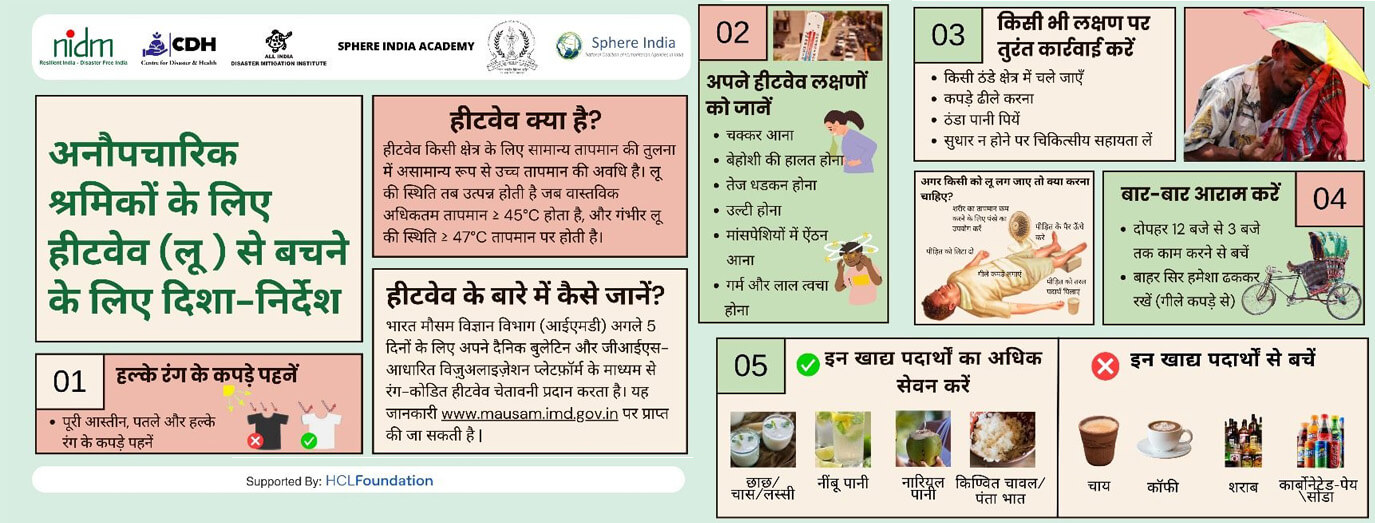
Introduction
India faces a growing threat from extreme heat, a danger amplified by climate change. Heatwaves devastate vulnerable communities, straining healthcare systems and disrupting livelihoods. As a national coalition of humanitarian, development, and resilience organisations, Sphere India is committed to mitigating these risks and building a heat-resilient future for all Indians.
The Power of Knowledge and Collaboration
Our approach, which centres on knowledge sharing, capacity building, and fostering robust coordination among stakeholders, recognises the crucial role that each of our members plays as part of this collaborative effort. We believe that informed action stems from a strong foundation of research and a shared understanding of priorities for heatwave advocacy, coordination and response. Through capacity-building sessions, we empower local communities and organisations with the knowledge and skills to effectively prepare for and respond to heatwaves. We also actively engage in research and advocacy, generating knowledge products that inform policy decisions and guide practical interventions.
As part of the heatwave response strategy, we organised a series of webinars through the Sphere India Academy on strategies for combating heatwave impacts at the individual, community, and household levels, along with targeted sessions on informal economy workers, safety protocols for schools and children, mental health and psychosocial impact, infrastructure and technological solutions, etc. These sessions were organised in collaboration with national and local organisations and nodal government agencies to ensure contextualised and effective responses, including sessions in local languages for wider dissemination of knowledge and building heatwave resilience. Several IEC materials on Heatwave Do’s and Don’ts were also circulated in English and Hindi following the sessions within the networks of collaborating institutions. This ensures reach to a larger audience in response to heatwaves through a collaborative, network-driven approach.
Integrating Resilience into Existing Frameworks
Mainstreaming heatwave resilience into existing development schemes and policies is crucial for long-term impact. This integration is particularly relevant for urban and rural areas, where heatwaves can exacerbate existing vulnerabilities. For instance, incorporating heat-resilient design principles into housing schemes can significantly improve living conditions for low-income communities. Similarly, integrating heat stress management strategies into livelihood programs, especially those involving outdoor labour, is essential for protecting vulnerable workers. Developing and implementing effective heat action plans is crucial to building long-term resilience to heatwaves in the face of exacerbated climate impacts. This requires coordination among government bodies, ground-level organisations, and vulnerable communities.
Understanding the Needs of Vulnerable Communities
Effective heatwave mitigation requires a deep understanding of the unique challenges faced by different communities. Those living in slums or on the outskirts of cities often lack access to basic amenities like shade, water, and healthcare, making them particularly susceptible to heat stress. Engaging with these communities directly, understanding their needs, and incorporating their insights into the design and implementation of solutions is not just essential but a moral imperative. The recent consultations organised by Sphere India and partners also emphasised the need for Community-Level Heat Resilience Action Plans that include vulnerable groups and their vulnerabilities to ensure effective and targeted interventions.
Conclusion
The urgency of addressing heatwave risks in India cannot be overstated. As the intensity and frequency of heatwave incidents are expected to increase, greater coordination and collaborative action plans are essential. By pooling resources and expertise, we can develop innovative solutions and implement effective strategies to safeguard vulnerable communities. We can build a more resilient future through collaborative action, knowledge sharing, and a community-centric approach. We encourage everyone to learn more about heatwave impacts and mitigation efforts, collaborate, and support organisations working to protect vulnerable communities. Together, we can build a heat-resilient India.
Disclaimer: The views expressed in this piece are those of the author/s and do not necessarily reflect the views or policies of AIDMI.